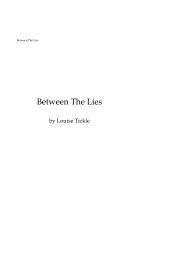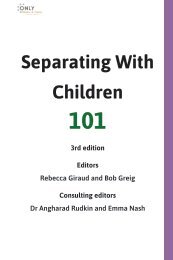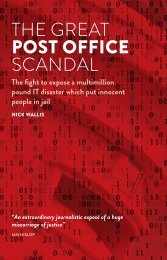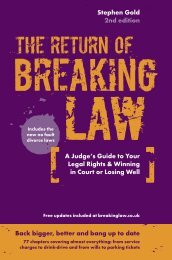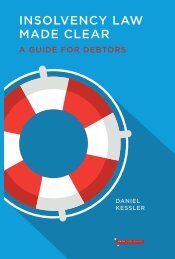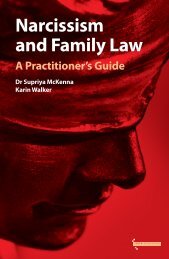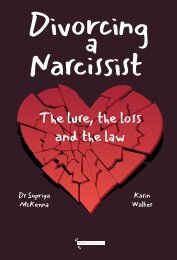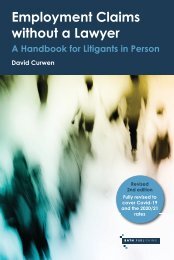The 'Secret' Family Court: Fact Or Fiction?
For approaching two decades, family courts have been accused of making life changing decisions about children and who they live with made in secret, away from the scrutiny of the public gaze. Recognising the force of these accusations, senior family courts judges have, over that time, implemented a raft of rule changes, pilot projects and judicial guidance aimed at making the family justice more accountable and transparent. But has any progress been made? Are there still suspicions that family judges make irrevocable, unaccountable decisions in private hearings? And if so, are those suspicions justified and what can be done to dispel them? In this important and timely new book, Clifford Bellamy, a recently retired family judge who has been at the sharp end of family justice during all these changes, attempts to answer those questions and more. He has spoken to leading journalists, judges and academic researchers to find out what the obstacles to open reporting are – be they legal, economic or cultural - and interweaves their insights with informed analysis on how the laws regulating family court reporting operate. Along the way he provides a comprehensive review of the raft of initiatives he has seen come and go, summarises the position now and uses this experience to suggest how this fundamental aspect of our justice system could adapt in the face of this criticism. Every professional working in the family justice system – lawyers, social workers, court staff and judges - as well as those who job it is to report on legal affairs, should read this informative, nuanced exposition of what open justice means and why it matters so much to those whose lives are upended by the family justice system.
For approaching two decades, family courts have been accused of making life changing decisions about children and who they live with made in secret, away from the scrutiny of the public gaze. Recognising the force of these accusations, senior family courts judges have, over that time, implemented a raft of rule changes, pilot projects and judicial guidance aimed at making the family justice more accountable and transparent.
But has any progress been made? Are there still suspicions that family judges make irrevocable, unaccountable decisions in private hearings? And if so, are those suspicions justified and what can be done to dispel them?
In this important and timely new book, Clifford Bellamy, a recently retired family judge who has been at the sharp end of family justice during all these changes, attempts to answer those questions and more. He has spoken to leading journalists, judges and academic researchers to find out what the obstacles to open reporting are – be they legal, economic or cultural - and interweaves their insights with informed analysis on how the laws regulating family court reporting operate. Along the way he provides a comprehensive review of the raft of initiatives he has seen come and go, summarises the position now and uses this experience to suggest how this fundamental aspect of our justice system could adapt in the face of this criticism.
Every professional working in the family justice system – lawyers, social workers, court staff and judges - as well as those who job it is to report on legal affairs, should read this informative, nuanced exposition of what open justice means and why it matters so much to those whose lives are upended by the family justice system.
Create successful ePaper yourself
Turn your PDF publications into a flip-book with our unique Google optimized e-Paper software.
<strong>The</strong> ‘Secret’ <strong>Family</strong> <strong>Court</strong> – <strong>Fact</strong> <strong>Or</strong> <strong>Fiction</strong>?<br />
to be hidden from public view. Public confidence in the justice system<br />
can only be assured if the courts and the evidence used in those courts<br />
are fully open to the public”. 19<br />
Similar views continue to be expressed by journalists. <strong>The</strong>y are not alone in<br />
holding those views. Even some family judges – and in particular some senior<br />
judges – have acknowledged the need to open up the <strong>Family</strong> <strong>Court</strong> and<br />
make its workings more transparent. Whilst it is, of course, essential that<br />
appropriate and robust safeguards are in place to protect children’s privacy<br />
and to ensure that the chances of them being identified are minimal, that<br />
does not mean that the restrictions currently imposed by section 12 of the<br />
Administration of Justice Act 1960 20 are either necessary or desirable. In<br />
my opinion it is no longer credible to seek to argue that open justice in the<br />
<strong>Family</strong> <strong>Court</strong> must be sacrificed on the high alter of guaranteed absolute<br />
privacy for children in order to ensure that justice is done. A more proportionate<br />
and balanced approach is required.<br />
In passing I note, as others have pointed out many times, that it seems odd<br />
that whereas hearings in the <strong>Family</strong> <strong>Court</strong> relating to children are held in<br />
private, appeals to the <strong>Court</strong> of Appeal and to the Supreme <strong>Court</strong> in cases<br />
relating to children are held in public. Indeed, appeals to the Supreme<br />
<strong>Court</strong> are broadcast live and the recordings are available to view for 12<br />
months after the date of the appeal hearing. 21 True it is that unlike the <strong>Family</strong><br />
<strong>Court</strong>, the appellate courts do not normally hear oral evidence (an appeal<br />
is a review of the decision of the lower court not a rehearing) but that does<br />
not detract from the point that appellate hearings demonstrate that appeal<br />
hearings in cases relating to children can be (and normally are) heard in<br />
public. So far as I am aware, there is no research evidence which demonstrates<br />
that any appellate court hearings have led to a child being identified<br />
or to a breach of a child’s privacy.<br />
In my opinion, the reality today is that whilst there continues to be a compelling<br />
argument in favour of protecting the identity and privacy of children<br />
involved in litigation in the <strong>Family</strong> <strong>Court</strong>, it does not follow, either as a<br />
matter of logic or as a matter of practical necessity, that that means that<br />
such cases must always be heard, from start to finish, in private, or that<br />
19<br />
Your right to know (2007) published by Pluto Press, London, pages 125 and 130.<br />
20<br />
I shall consider section 12 of the Administration of Justice Act 1960 in detail in Chapter 4.<br />
21<br />
On 14 January 2020, the Law Society Gazette reported that, speaking at an event organised<br />
by the UK association of Jewish Lawyers and Jurists, the Master of the Rolls, Sir Terence<br />
Etherington, announced that: “We are hoping to get a change to regulation which will<br />
allow us to live stream family cases in the <strong>Court</strong> of Appeal. At the moment you cannot do<br />
that at all.”<br />
20



